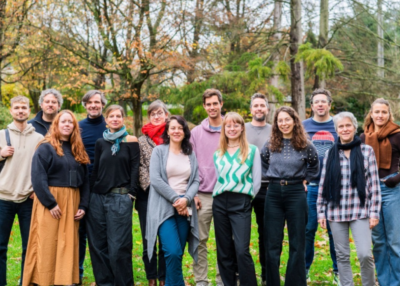
2020, a year of R&I resource mobilisation
Via its National Contact Point (NCP), hub.brussels supports candidates and potential participants in European programmes. In 2021, the Horizon 2020 programme became Horizon Europe, the 9th European Union Framework Programme for Research and Innovation (R&I) for the 2021-2027 period. What’s the key? The response from the NCP coordinator at hub.brussels!
For several years, the European Union has provided funding programmes to support and encourage European research, known as “Framework Programmes for Research and Technological Development” . Today, the Horizon Europe programme succeeds Horizon 2020. Its objective is to further and tangibly anchor research and innovation in a context marked by societal and European challenges.
To increase participation from Brussels-based actors in this type of programme, the National Contact Point organises dissemination, training and information activities.
Available to respond to all questions from those who are interested, NCP also directs towards other funding programmes.
Interview with Ji-Hyeon Kim Vanguers, NCP Coordinator
What does being the National Contact Point for European research programmes in Brussels entail?
NCP helps companies, universities, research centres and other stakeholders in the Brussels-Capital Region access European funding for Research and Innovation.
Under Horizon 2020, we have paid particular attention to SMEs and newcomers in order to help them meet the requirements of this highly competitive programme. Specialised and engaged in the different topics of the programme, our advisors have been able to offer them a tailor-made service!
In the Brussels region, note that the success rate (the number of projects selected) is 20%, while on a European level the average success rate is 12%. Among the many factors behind this success, we mainly count on the strong presence of European actors in Brussels and high-performing universities and colleges that have aligned their objectives with those of the European Commission.
Could you give us some examples of companies in Brussels that have received subsidies under Horizon 2020?
Last year, Fyteko received a subsidy of 1.9 million euros for its “Nurspray” project, involving an innovative biostimulant to help crops manage the effects of climate change, which was submitted to Horizon 2020’s EIC Accelerator. Funding from the European Union will enable the company to improve the product formula, increase its production process and prepare for its launch on the European market in 2022-2023.
Three months later, MoveUp received a subsidy of 2.7 million euros (subsidy + equity) for its EXPANSE project which was submitted to the EIC Accelerator pilot by the cut-off date in March. This enabled the SME to develop its mobile health platform that monitors, informs and treats patients by means of standardised and validated protocols.
In 2018, the technology and consultancy company 3E had already received a subsidy of 2.5 million euros as part of phase 2 of Horizon 2020’s SME Instrument (the EIC Accelerator’s predecessor instrument) for its “Synaptic Building” project, a tool that uses artificial intelligence to improve building comfort and reduce building energy, operational costs and CO2 emissions. This project also enabled the creation of DeltaQ, a company aiming to continuously optimise the management of buildings. In 2019, 3E had already received 900,000 euros in funding as coordinator of a “FTI – Fast Track to Innovation” project (2.2 million euros), still under Horizon 2020. This funding supported the development of an automated low-cost solution to generate reliable data and analyses for wind resources.
Do you work with other actors in Brussels?
Yes, the European R&I framework programmes are intended for all categories of actors, us included! Several public authorities in Brussels have thus received Horizon 2020 funding for projects carried out in collaboration with international partners (EU or non-EU), some of which include:
- The STIB (the Brussels Intercommunal Transport Company), which is partner of “Prevent” (Procurements of innovative, advanced systems to support security in public transport), a project brought to life in response to the terrorist attacks on 22 March 2016 in Brussels, bringing together 22 organisations from 10 countries.
- Bruxelles Environnement has participated in several projects on the circular economy, energy performance of buildings, etc.
- The City of Brussels itself participates in the “URBiNAT” project, which aims to find nature-inspired solutions for urban developments in the city.
Could you tell us about the “European Green Deal” call for projects?
This is the latest big call for projects from Horizon 2020, which closes on 26 January and has a budget of 1 billion euros. The H2020 GD call responds to the pressing need to address the climate crisis and to ensure better protection of the continent’s unique environment and biodiversity. At the same time, the call addresses the equally urgent challenge of contributing to Europe’s recovery as a result of the Covid-19 crisis, by contributing directly to the European Union’s recovery plan.
NCP Brussels helps candidates search for partners or develop their proposal. The projects must meet the needs related to the climate crisis, protection of the environment and biodiversity and contribute to Europe’s recovery.
More blogs

After Audi: Brussels foreign trade in the first half of 2025
Posted on 28/01/2026
